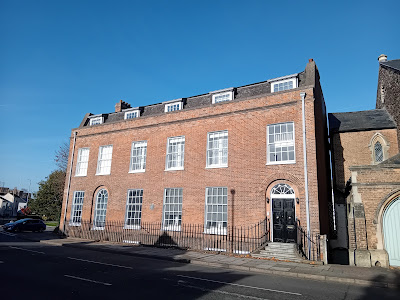Charles George Gordon was born on 28th January 1833 in Woolwich. His parents were Lieutenant-General Henry William Gordon and his wife Elizabeth (nee Enderby). He attended Fullands School in South Road, Taunton c1843-1846. During this time he lodged at a house in Upper High Street.
In around 1846 he attended a military school in Shooters Hill and in 1848 he entered the Royal Military Academy at Woolwich. He was commissioned second lieutenant in the Royal Engineers in June 1852. In February 1854 he was promoted to lieutenant and was appointed assistant garrison engineer at Pembroke Dock. While at Pembroke he became a committed Christian.
Charles Gordon volunteered for service in the Crimean War in 1855. He took part in the attack on Redan and the siege of Sevastapol. He was a proficient map maker and in 1856-8, after the end of the Crimean War, he was involved in surveying and delineating the new boundaries between the Russian and Ottoman empires in modern-day Romania and later in Armenia.
In April 1859 Gordon was promoted to the rank of captain and was based at Chatham until June 1860 when he volunteered to fight the Chinese in the Arrow War (also known as the 2nd Opium War). He remained in China until the end of 1864 and played a part in crushing the Taiping rebellion and in defending Shanghai. He was given the nickname Chinese Gordon by the British press and public.
Gordon returned to England in early 1865 and was Commander of the Royal Engineer at Gravesend in Kent. He was given the job of supervising the building of forts at the mouth of the River Thames. In his spare time he helped local homeless boys and allowed some of them to live in his house.
In 1873 Ismāʿīl Pasha, the Khedive (Viceroy) of Egypt appointed Gordon to the post of Governor of the province of Equatoria in Sudan. From 1874-1876 he mapped the Upper Nile River, set up a line of stations along the river as far as what is now Uganda and suppressed the slave trade in Equatoria. In 1877 he accepted the post of Governor General of Sudan. He crushed rebellions and further reduced the slave trade.
He returned to England in early 1880. He then served in India, China, Mauritius and the Cape Colony until October 1882. He spent most of 1883 studying antiquities in the Holy Land.
In 1884 Gordon was sent to Sudan by the British government to evacuate Egyptian troops from Khartoum. They were under threat of attack by the Mahdists, who were followers of the Sudanese religious leader Muḥammad Aḥmad al-Mahdī. Gordon arrived in Khartoum in February 1884. He managed to evacuate 2,000 civilians and 600 soldiers before the Mahdists besieged Khartoum in March 1884. On 26th January 1885, Mahdists broke into Khartoum and killed Gordon. A few days later a relief force arrived. Gordon was hailed as a martyr by the British press and acquired the name Gordon of Khartoum. His body was never found.



No comments:
Post a Comment